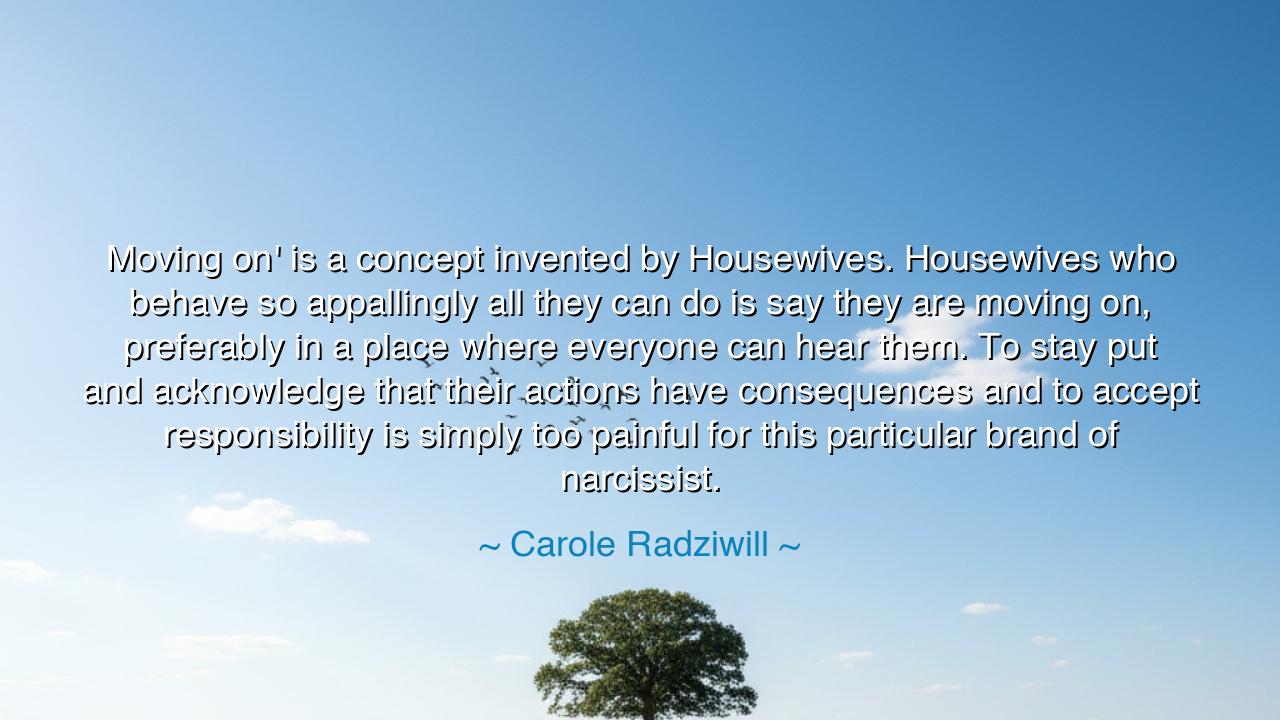
Moving on' is a concept invented by Housewives. Housewives who
Moving on' is a concept invented by Housewives. Housewives who behave so appallingly all they can do is say they are moving on, preferably in a place where everyone can hear them. To stay put and acknowledge that their actions have consequences and to accept responsibility is simply too painful for this particular brand of narcissist.






Hear the sharp and piercing words of Carole Radziwill: “‘Moving on’ is a concept invented by Housewives. Housewives who behave so appallingly all they can do is say they are moving on, preferably in a place where everyone can hear them. To stay put and acknowledge that their actions have consequences and to accept responsibility is simply too painful for this particular brand of narcissist.” In this utterance lies not only satire but a deep unveiling of human nature. For she does not speak merely of housewives on a stage of vanity, but of all who cover their wrongs with words instead of repentance, who clothe their shame not with humility but with the hollow cry of “moving on.”
The ancients knew this weakness of spirit well. To sin, to fail, to wound others—these are the lot of mankind. Yet the noble man or woman faces their fault, stands amidst the wreckage of their deeds, and declares, “This was mine, and I will bear it.” To do otherwise is to flee like a coward from the battlefield, crying out that the war is finished though the field is still strewn with the bodies of the fallen. True responsibility demands acknowledgment, repair, and transformation; false responsibility demands only escape.
Consider the tale of King David, who, when confronted with the weight of his sin, did not hide behind the easy words of dismissal. He did not say, “Let us move on.” He rent his garments, confessed his fault, bore the pain of consequence, and sought renewal through repentance. His strength lay not in denial, but in the courage to remain present in the pain until he was cleansed by it. This is the opposite of the narcissist, who cloaks their shame with shallow phrases and refuses the purifying fire of accountability.
Yet history also gives us the tragic counterexample. When Marie Antoinette dismissed the cries of her starving people with, “Let them eat cake,” she was not only blind to responsibility but arrogant in her detachment. She moved past their suffering without owning her role in it, and in doing so, hastened her downfall. Here we see the lesson of Radziwill’s words: that to ignore consequence, to deny responsibility, and to retreat into careless dismissal is to invite ruin upon oneself.
Radziwill’s observation, though clothed in satire, exposes the wound of modern man: the fear of pain. To acknowledge wrongdoing is painful, to accept blame feels like death to pride. And so many prefer the false balm of “moving on,” proclaiming it aloud to drown the whispers of guilt. Yet this balm does not heal—it festers, it infects, and it poisons the soul. Only by staying present in the aftermath of one’s actions, only by bearing the full weight of consequence, can true growth and redemption be found.
The lesson for you, O listener, is clear: do not seek the easy escape. Do not rush to “move on” when you have wronged another. Stand firm in the place of your failure, acknowledge it fully, and make amends. For the one who flees remains a prisoner of pride, but the one who endures responsibility becomes free. Courage is not moving on—it is staying long enough to heal what you have broken.
Practical actions are given: when you err, confess it without excuse. Ask forgiveness, not in whispers but in sincerity. Make restitution where possible, and let the pain of consequence teach you wisdom. Resist the urge to drown out shame with chatter, and instead turn inward, letting silence and truth refine you. In this way, your soul will grow in honor, and your life will be marked not by evasion but by strength.
Thus remember Radziwill’s hard wisdom: the false moving on is cowardice, but the true staying is courage. Do not be as the shallow, who escape with words; be as the noble, who endure their consequences, accept responsibility, and from the ashes of failure rise purified and renewed. For in truth, only those who face their deeds with open eyes may truly move forward—and when they do, it is no longer a phrase for show, but a step toward genuine redemption.






AAdministratorAdministrator
Welcome, honored guests. Please leave a comment, we will respond soon